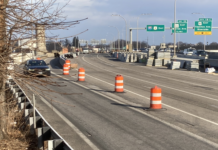For 25 years, Stephen C. Smith has been executive director of the Southeastern Regional Planning & Economic Development District, based in Taunton, which serves 27 cities and towns in southeastern Massachusetts. Created by state law, the district is governed by a commission of local officials and citizens. The agency, which receives no state funding, is supported mostly by federal grants, particularly transportation funds that make up about half of its budget.
Smith spoke recently with Providence Business News about economic-development plans for cities such as Fall River and New Bedford, the fate of the Raynham dog track and the casino proposed in Middleboro.
PBN: Are there any plans in the works to help some of the distressed cities, such as Fall River and New Bedford?
SMITH: The most significant thing that’s going on that we’re heavily involved in is the South Coast Rail Project, and that is the proposal to bring commuter rail service to Fall River and New Bedford, by way of Taunton, into Boston. The projected start up date of that project is not for another seven or eight years, and the cost is very high, north of a billion dollars. We’re working closely with the state, trying to establish the best route. But, more significantly, we’re trying to figure out how to maximize the economic impact that it will have on the communities it serves. … It would terminate, or begin, depending on how you look at it, in Fall River and go north to Boston.
PBN: What will happen to Raynham Park, now that voters have decided to ban greyhound racing in the commonwealth?
SMITH: The casino issue is very big in southeastern Massachusetts, and [is connected to the race park]. The proposed Mashpee Wampanoag casino facility would be in Middleboro, which is one of the towns we serve. …
The recent vote to ban dog racing in the commonwealth affects the Raynham track, which has been arguing for slot machines for quite a while. Now they [at Raynham] are making that case more strongly – that the voters have put them out of the dog racing business and they would like to have slot machines – and they claim they could be up and running in a very short period of time. I have got to think that they’ll get more serious consideration now that the dog racing ban was voted in. This is all tied in with the casino because what the state does in terms of allowing activity at the track could impact [the state’s] posture with regard to the proposed Native American casino. …
In addition, one of the alternative routes for the South Coast Rail Project proposes a rail stop at the dog track, at the current facility in Raynham, not for the purpose of serving the dog track … but for the potential of doing transit-oriented development around there, which would be a mix of residential development and shops and so forth. Particularly if Raynham Park is going out of business as a dog track, there is great potential for redevelopment as a transit-oriented development. So, I think you’re going to see Raynham Park in the news a lot, whether as a slot emporium or as a transit-oriented development for the train, or as a combination of both.
PBN: Has your organization taken a stand for or against the casino?
SMITH: We have been very involved and we have been accused of taking all kinds of positions. In fact, we have not taken an official position simply because we have to be in the position of evaluating its impact objectively. However, we have spent a lot of time working with the communities surrounding Middleboro, trying to formulate their postures with regard to the facility. And they’re mostly opposed or very concerned about the impact. So, we’ve sort of been associated with that [opposition]. We have said we don’t think a casino is the best kind of economic development. But, having said that, we have to look at it in terms of what its impact would be on traffic, on housing, on water supply and so forth.
There’s also interest on the casino issue in New Bedford. Developers have bought up rights to options on property in the Hicks-Logan neighborhood, which is abutting Interstate 195 along the waterfront, in the hope that, if casino gambling is approved in Massachusetts, they would make a play to have a casino there. The city seems to be ambivalent about it. If it comes, [city officials will] work with it and they’ll make it happen, but they don’t seem to be bending over backwards to pursue it because they’re looking at other development options.
PBN: Any plans for waterfront development in any of the communities you work with?
SMITH: Fall River and New Bedford are both working on projects that would convert waterfront highways – in the case of Fall River, it’s Route 79; in New Bedford, it’s Route 18 – to boulevards because they have acted as a buffer between the city and the waterfront in both cases.
Both cities are talking about a major station to serve the city near the waterfront that could have transit-oriented development around it and, if carefully planned, could be a real catalyst for the cities. And both of them have proposed sort of a tourist drop-off station as well, that would not have a lot of parking, but in the case of Fall River would be at Battleship Cove where all the tourist attractions are. In the case of New Bedford, it would be at the state pier, which would serve the national historic park and the whaling museum. •












